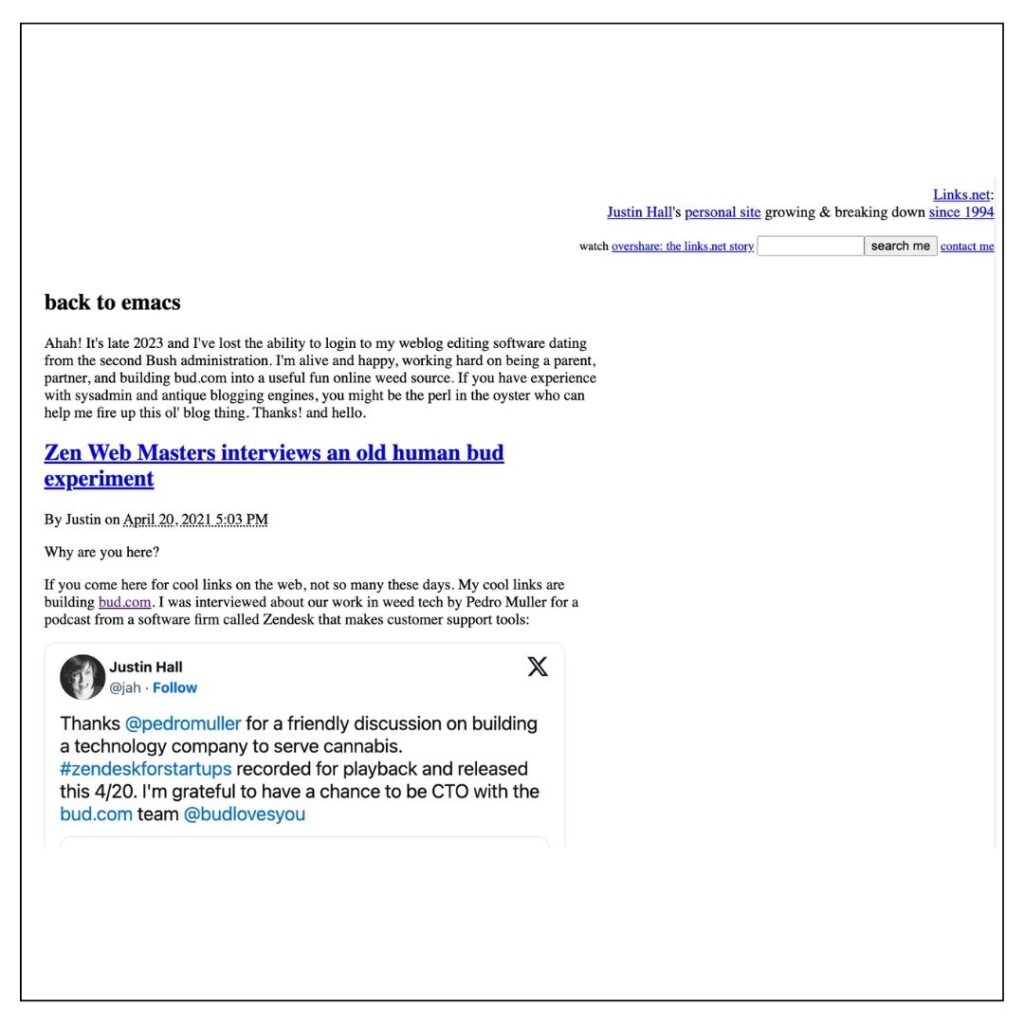Table of Contents
- Finding the First Blog Published
- The Dawn of Blogging
- The Story Behind the First Blog Published
- The Impact of the First Blog Published
- The Transformation of Publishing Through Blogging
- What’s Next for Blogging
- Lessons from the First Blog Published
Finding the First Blog Published
What is the first blog published?
Imagine a time when the term “blog” hadn’t yet entered our lexicon, a digital diary was a novel concept, and the Internet was beginning to weave its web across the globe.
In this nascent stage of online content creation, a spark was lit that would kindle the fire of personal online expression: the first blog published in the world. This remarkable innovation laid the groundwork for the blogging revolution, transforming how we share, consume, and interact with information online.
The Dawn of Blogging
In the 1990s, the digital landscape vastly differed from what we know today. The Internet was still in its youth, and sharing personal thoughts globally was groundbreaking. Within this pioneering era, Justin Hall, a college student with a penchant for exploration and a keen interest in the World Wide Web, embarked on an experiment that would unknowingly shape the future of digital communication.
He began documenting his life and sharing his discoveries about the new Internet technology on his homepage at Links.net. He might not have realized it then, but his creation would earn him the title of “the founding father of personal bloggers.”
His homepage wasn’t initially intended to start a revolution; it was simply a platform where he could share reviews of HTML examples while surfing the early web. These entries, written in a casual, diary-like style, were the seeds from which the mighty blogging tree would grow.
Hall’s candid posts, covering various topics from tech to his daily experiences, became a window into the life of a real person behind the screen. They offered an authentic, unfiltered glimpse into individual perspectives, a stark contrast to the impersonal nature of traditional media at the time. This personal touch made Hall’s page stand out and resonate with early Internet users hungry for connection and community.
Today, we might take the concept of blogging for granted, but Hall’s approach was revolutionary back then. By simply wanting to share his thoughts and findings, he inadvertently paved the way for millions of voices to be heard through blogging. The significance of his actions can be seen in the vast expanse of blogs that now cover every imaginable topic, each adding to the rich tapestry of the Internet.
The Story Behind the First Blog Published
It was 1994, and Justin Hall, then a young college student, embarked on a digital adventure that would leave an indelible mark on the Internet’s history. His posts on his website (still active to this day) served as a resource for others navigating the nascent web, providing insights into the building blocks of websites.
Hall’s method of sharing valuable links and his commentary laid the groundwork for an essential element of blogging—linking to other sites and adding one’s take on the content. Hall’s impact on the burgeoning world of digital content cannot be overstated. He wasn’t just sharing links; he was sharing himself. His openness and personal touch made his site stand out.
This personal angle, showcasing an individual’s thoughts and experiences, became the hallmark of blogging and has influenced countless individuals to share their own stories online.
The significance of Hall’s contributions to online culture is seen in the way we communicate today. By setting a precedent for personal expression on the Internet and creating the first blog published, he invited others to join the conversation, effectively democratizing the web. The ripple effects of his early work continue to shape the landscape of digital communication, proving that a single voice can make waves in the vast ocean of the Internet.
The Impact of the First Blog Published
In the pre-blog era, personal online expression was primarily confined to rudimentary websites or forums. Hall’s Links.net broke this mold by offering an intimate glimpse into his thoughts, experiences, and interests through curated HTML links. It personalized the web experience, making it more relatable and accessible.
Before the advent of blogging, the publishing industry was dominated by gatekeepers such as editors and publishers, who decided what content was worthy of being shared with the masses. Hall’s work on Links.net demonstrated that individuals could bypass traditional publishing routes and still find an audience. His pioneering efforts didn’t just influence personal bloggers; they were a harbinger of change for the entire publishing landscape.
The democratization of content creation and distribution meant that niche topics, underrepresented voices, and alternative perspectives could reach readers directly without intermediaries.
The significance of Hall’s creation extends beyond the realm of blogging itself; it played a pivotal role in influencing the history of blogging and shaping the future of digital publishing. The interactive nature of blogs, allowing for comments and discussions, prefigured social media platforms that would later dominate the Internet.
Blogs became a space not only for individual expression but for community building and conversation, setting the stage for the participatory culture that is now ubiquitous online. In effect, the first blog published was not just a collection of links but a prototype for the interactive, user-generated web we know today.
As the first blogger, Justin Hall may not have realized the full impact of his actions at the time. Yet, his homepage at Links.net undoubtedly influenced the development of blogging as a form of personal expression, altered the trajectory of publishing, and helped shape the fabric of digital communication. Hall’s example showed that individual stories and experiences were in the broader narrative of our collective online existence – a legacy that continues to inspire and evolve within the digital landscape.
The Transformation of Publishing Through Blogging
The publishing landscape has evolved dramatically since the advent of the Internet, and blogging has been at the forefront of this transformation. Let’s dive into how blogging has reshaped the methods by which content reaches its audience.
Traditional publishing once meant gatekeepers, selective processes, and often a lengthy journey from manuscript to bookstore shelf. Blogging, on the other hand, offered an immediate platform for anyone with Internet access.
Writers no longer needed to wade through the approval of editors and publishers to see their words in print. With a few clicks, their thoughts could reach a global audience instantaneously. This shift not only sped up the publishing process but also lowered the barriers to entry for aspiring authors and thought leaders.
Before the era of blogs, personal narratives and opinions were confined mainly to diaries or the letters to the editor sections of newspapers. Blogging blew open the doors for these personal stories to be shared with the world.
Unlike traditional media, which often upheld a formal tone and distance from its audience, blogs thrived on a conversational style that fostered a sense of connection with readers. They became platforms for storytelling and building communities around shared interests and experiences.
In essence, blogging has not merely altered the publishing landscape; it has redefined it. By empowering individuals to share their stories and opinions, blogging has unlocked a new realm of personal expression and community building. Its impact on disseminating and consuming information is a testament to its revolutionary power. As we look towards the future, we can only imagine how blogging will continue to shape the fabric of our digital communication.
What’s Next for Blogging
As we’ve seen, blogging has evolved from a niche hobby into a powerful tool for personal expression and information dissemination. But what does the future hold for this versatile medium? Let’s speculate on the upcoming trends and developments that may shape the blogging sphere in the future.
Future Trends in the Blogosphere
The evolution of blogging has been remarkable, with its roots tracing back to Justin Hall’s pioneering work in creating the first blog published. As technology advances and our digital landscape becomes increasingly interconnected, we can anticipate several key trends to emerge.
Artificial Intelligence (AI) is poised to play a significant role, potentially offering automated content creation tools that assist bloggers in generating ideas and even drafting posts. Moreover, we might see the rise of more personalized content as data analytics grows more sophisticated, allowing bloggers to tailor their posts to the interests and preferences of their audience.
Advancements in Blogging Platforms and Technologies
Technology never stands still, and neither will the platforms that support blogging. Soon, we can expect advancements that make blogging even more user-friendly and accessible. This could include seamless integration with other forms of media, such as podcasts and video blogs (vlogs), which are already gaining popularity.
Additionally, we may witness a surge in mobile-first blogging platforms, considering the growing number of users who access the Internet primarily through smartphones. These platforms will likely emphasize speed and simplicity, enabling bloggers to publish content online.
Blogging in the Social Media Ecosystem
Social media has transformed the way we communicate and share information. Blogging’s role within this ecosystem continues to evolve as it intersects with various social media platforms. We can foresee blogs becoming more interactive, perhaps integrating features allowing real-time discussions or collaborations with followers.
There is also potential for greater synergy between blogs and social media profiles, making it easier for creators to share content across multiple channels and reach wider audiences. As social media platforms refine their algorithms, bloggers who adapt by creating shareable, engaging content will likely see increased visibility and engagement.
In contemplating the future of blogging, it is essential to consider how these advancements will enhance the blogging experience and challenge bloggers to maintain authenticity and creativity in an ever-changing digital environment.
Lessons from the First Blog Published
We’ve journeyed through the annals of digital history to uncover the roots of the blogging phenomenon, beginning with Justin Hall’s first blog published. He jumped foray into what would become a world-changing mode of expression. As we draw this recounting to a close, it’s fitting to reflect on the lasting significance of that first published blog and its profound impact on the digital landscape.

The inception of blogging, marked by Hall’s candid online diary, heralded a new dawn of personal storytelling and information sharing. From those early days in 1994, when a simple personal homepage on Links.net offered HTML reviews and musings, we now find ourselves amidst a vast sea of digital narratives and perspectives.
This evolution from a solitary voice to a global chorus exemplifies the democratizing power of the Internet, where anyone with access and a story can reach an audience of millions.
As you’ve seen, blogging has survived and thrived in the face of ever-shifting digital trends. It’s become a resilient platform for individuals around the globe to share insights, challenge norms, and foster communities.
